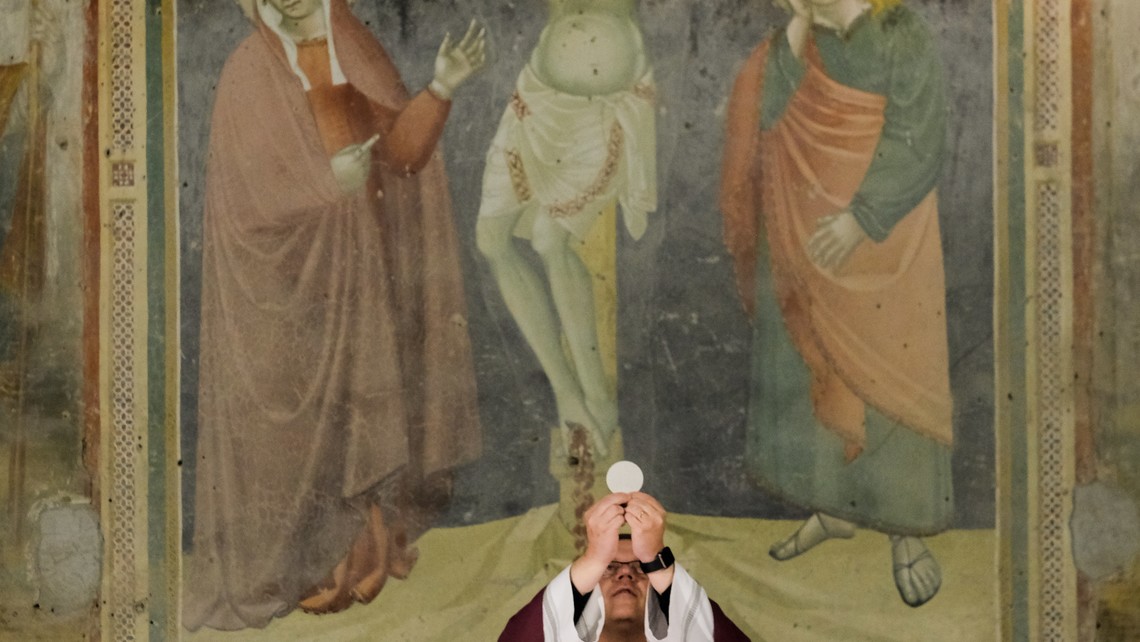
Everyone is called to enter the kingdom.[1] The significance of this statement introduces us to the intention God has for his children; the desire to share His love for all eternity. It also proposes whether man ultimately decides to engage God in this journey of faith. God’s divine intention to nourish us in His love is both perpetual and infinite. We encounter this reality in the way He rescues Israel from Egyptian bondage with the apex of this rescue centered on the Passover meal[2] the feast of unleavened bread or the continual nourishment He provides through the manna[3] in the desert for forty years until Israel reached the land of Canaan.
A distinction to be made of the Manna from Heaven is that its origin is supernatural. God chose to minister to his people with bread from Heaven. We know through the Word of God that Israel ate their fill each day and preserved the rest of the Manna in a jar under the direction of Moses. This jar liturgically identified today as the tabernacle was used to protect the Manna which was viewed as supernatural, miraculous, and holy by the Israelites. It is important to note that Jesus makes a direct reference to the Manna from heaven in his instruction on the Our Father through the following petition; give us this day our daily bread.[4]
A desire of the heart
As a father to four living children and nine in heaven, one of my principal responsibilities is to make certain my living children are always nourished both spiritually and physically. This requires a willingness to protect and nourish them no matter the cost. I rigorously argue that the role of a father and husband echoes God’s testimony and actions who never ceases to nourish his children.
When my youngest daughter began to express a genuine desire to receive the body and blood of Christ in the Holy Eucharist, her interest was not due to her observance of everyone else receiving Christ at Mass. Her sacramental reality began the moment we as a family witnessed and explained to her who Christ is and that he desires a loving and active relationship with her. This point was strengthened through my wife’s heroic and loving example as the primary catechist to our daughter which I am eternally grateful.
As she began to learn and understand the Trinity and the role of Christ as the Son of God, his crucifixion and death on the cross, her desire to receive the bread from heaven became more direct and focused. There was a sense of awe and wonder on how Christ could offer his own body in the form of bread and wine. In a way what my daughter desired was a journey to calvary which in reality is how we should prepare our children to receive Christ in the Holy Eucharist. St. Augustine reminds us that the bread which you see on the altar, once it is sanctified by the word of God, is the body of Christ. And that the chalice, or rather what the chalice contains, once it is sanctified by the word of God, is the blood of Christ.[5]
Our Journey to Calvary
When I saw my daughter’s face as she witnessed the consecration at Mass one particular Sunday morning and then stoically looked at my wife expressing a firm conviction to receive our Lord, it became evident that the time had arrived. This spiritual turning point is where your own child is asking to receive the cup of our Lord and not the cup of demons. My daughter came to the realization that she will not be satisfied until she receives the bread of God.
Every time we receive Christ in the Holy Eucharist we publicly affirm and profess Christ’s victory over sin and death. We also acknowledge through our own Profession of Faith by baptism in the Creed that Christ as Lord, desires to always nourish his children in anticipation of our eternal journey with Him in heaven.
St. Cyril of Jerusalem reminds us:
On the night he was betrayed our Lord Jesus Christ took bread, and when he had given thanks, he broke it and gave it to his disciples and said: “Take, eat: this is my body.” He took the cup, gave thanks and said: “Take, drink: this is my blood.” Since Christ himself has declared the bread to be his body, who can have any further doubt? Since he himself has said quite categorically, This is my blood, who would dare to question it and say that it is not his blood?
Therefore, it is with complete assurance that we receive the bread and wine as the body and blood of Christ. His body is given to us under the symbol of bread, and his blood is given to us under the symbol of wine, in order to make us by receiving them one body and blood with him. Having his body and blood in our members, we become bearers of Christ and sharers, as Saint Peter says, in the divine nature. Do not, then, regard the eucharistic elements as ordinary bread and wine: they are in fact the body and blood of the Lord, as he himself has declared. Whatever your senses may tell you, be strong in faith.[6]
As the time nears for my daughter to receive the bread of God, her desire to receive Him expresses a willful acceptance of Christ and everything that He represents as God the Son Savior of the World.
Sight, touch, and taste in thee are each deceived; the ear alone most safely is believed: I believe all the Son of God has spoken than truth’s own word there is no truer token. God only on the cross lay hid from view; but here lies hid at once the manhood too. And I, in both professing my belief make the same prayer as the repentant thief.
Adore Te, St. Thomas Aquinas, Summa Theologiae, III, 77, 1






